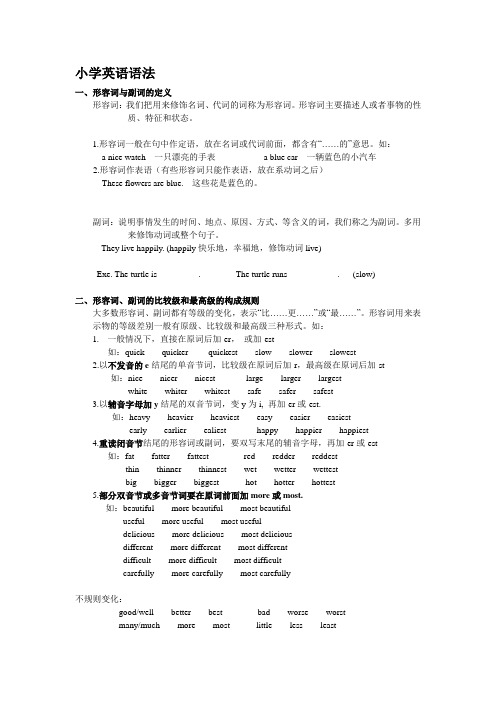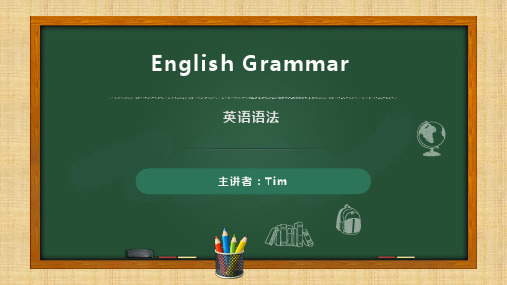英语入门教程5 英语语法 第7章 副词 第13课 形容词VS副词
(word版)初中英语语法形容词、副词精华版

初中英语语法形容词、副词的复习教案Brainstorm:你能分清形容和副的用法和写法?你知道怎么使用形容和副的比和最高?你知道在英中有很多形容?一.形容和副的辨析形容和副的区形容:用来修名副:用来修、形容和副所以区形容和副的关在于看它所修的内容。
例如:Candyisalovelygirl.Candysmileslovely.在两句中,都有lovely个,但是性却完全不同。
在第一句中lovely用来修girl所以是形容,而第二句中,lovely用来修smiles,所以是副。
2. 形容副的律a. 一般的形容在尾加ly副。
例如:careful-carefullyb. 以元音加e尾的要去 e在加ly。
例如:true-trulyc.音加y尾的去yi在加ly。
例如:angry-angrilyd.音y尾直接加ly。
例如:shy-shylye.以le尾的直接将ey。
例如:terrible-terribly二.1.f. 形容、副同形:hard,fast,friendly,late,early,lovely,long 。
局部同学注意,其中很多加ly之后就成其他意思的了。
例如:hardly就成“几乎不〞的意思,是小学段五大形否认〔few,little,never,seldom,hardly〕之一。
形容和副的比比的范:一般两者或两个局部行比。
例如:Im’tallerthanyou.GroupOnedidbetterthanGroupTwo.比的构:构上比有三个明的志。
①than:一般用than接两个比的局部。
例如:TomrunsfasterthanMike.其中Tom和Mike是比的两局部,用than接他行比。
在than的句式中有一个需要同学特注意:Im’tallerthananyotherstudentsinmyclass.句中用than接的是I和anyotherstudentsinmyclass两个局部,其表示的是最高的概念,我比我班其他同学都要高,其中anyother⋯⋯是固定搭配,任何其他的。
(完整版)小学英语语法——形容词副词

小学英语语法一、形容词与副词的定义形容词:我们把用来修饰名词、代词的词称为形容词。
形容词主要描述人或者事物的性质、特征和状态。
1.形容词一般在句中作定语,放在名词或代词前面,都含有“……的”意思。
如:a nice watch 一只漂亮的手表 a blue car 一辆蓝色的小汽车2.形容词作表语(有些形容词只能作表语,放在系动词之后)These flowers are blue. 这些花是蓝色的。
副词:说明事情发生的时间、地点、原因、方式、等含义的词,我们称之为副词。
多用来修饰动词或整个句子。
They live happily. (happily快乐地,幸福地,修饰动词live)Exe. The turtle is _________. The turtle runs ___________. (slow)二、形容词、副词的比较级和最高级的构成规则大多数形容词、副词都有等级的变化,表示“比……更……”或“最……”。
形容词用来表示物的等级差别一般有原级、比较级和最高级三种形式。
如:1.一般情况下,直接在原词后加-er,或加-est如:quick------quicker-------quickest slow------slower------slowest2.以不发音的e结尾的单音节词,比较级在原词后加-r,最高级在原词后加-st如:nice------nicer------nicest large------larger------largestwhite------whiter------whitest safe------safer------safest3.以辅音字母加y结尾的双音节词,变y为i, 再加-er或-est.如:heavy------heavier------heaviest easy------easier------easiestearly------earlier------ealiest happy------happier------happiest4.重读闭音节结尾的形容词或副词,要双写末尾的辅音字母,再加-er或-est如:fat------fatter------fattest red------redder------reddestthin------thinner------thinnest wet------wetter------wettestbig------bigger------biggest hot------hotter------hottest5.部分双音节或多音节词要在原词前面加more或most.如:beautiful------more beautiful------most beautifuluseful------more useful------most usefuldelicious------more delicious------most deliciousdifferent------more different------most differentdifficult------more difficult------most difficultcarefully------more carefully------most carefully不规则变化:good/well------better------best bad------worse------worstmany/much------more------most little------less------leastfar------farther------farthest (指距离的远近)far------further------furthest (表示程度上更进步)old------older------oldest (表示年纪大)old------elder------eldest (表示长幼关系)三、形容词、副词比较级的用法表示两者间的比较用比较级。
英语入门教程5 英语语法 第7章 副词 第7课 词尾特征1

Adjective & Adverb
Exercise 1
Te l l i f t h e f o l l o w i n g u n d e r l i n e d w o rd s a re u s e d a s adjectives or adverbs. 判断下列划线词汇是用作形容词还 是副词。如果是形容词,括号里填Adj.;如果是副词,括号里 填Adverb.。
1 The water is so deep. (
)
2 I feel pretty good today. (
)
3 You didn’t work hard enough. (
)
4 Why did you get up late this morning? (
)
5 Health comes first. (
Answer Key to Exercise 2
Put the following sentences into Chinese. 将下列句 子翻译成中文。 1 The First Lady came first. 总统夫人先到。 2 The pretty painter plays ping-pong pretty well. 那位美丽的油画家打乒乓打得很好。 3 His hero is working hard on a hard test. 他的英雄正在努力备战一场有难度的考试。
)
Exercise 2
Put the following sentences into Chinese. 将下列句 子翻译成中文。 1 The First Lady came first.
初中英语语法之形容词,副词

初中英语语法之形容词&副词初中英语语法之形容词&副词形容词副词的原级、比较级和最高级1、分类:形容词和副词有原级、比较级和最高级三级。
2、规则变化:(1)单音节和部分双音节形容词和副词,在原级的后面加上er,est构成比较级和最高级。
a)直接加er,est :b)以重读闭音节结尾的,要双写最后一个辅音字母,后加er,est:c)以辅音字母+y结尾的,先把y改为i再加上er,est:(2)两个音节或两个以上的音节的,在原级前加more / most.3、不规则变化:原级比较级最高级good好的better更好的best最好的well好;(身体)好的,bad,badly糟糕的,糟糕地worse更糟糕的,更糟糕地;(身体)更不舒服的worst最糟糕的,最糟糕地;(身体)最不舒服的ill(身体)不舒服的many许多的(可数)more更多的;更most最多的;最much许多的(不可数);非常little少的less更少的least最少的far远的;远地farther更远的;更远地farthest最远的;最远地further进一步的(地)furthest最深刻的(地)4、形容词和副词的原级、比较级和最高级的用法:(1) 讲述某人/物自身的情况时,用原级。
基本句型是:主语(sb./sth) + 谓语动词+(very/too/so/quite/rather…) + 形容词/副词原级+….如:He is very oldnow. 他现在很老了。
They ran quitefast. 它们跑得相当快。
The weatherlooks rather bad. 天气看上去相当糟。
I am sohappy! 我是如此的快乐!☆表示两者之间没有差别时,使用句型:主语(第一个人物) + 谓语动词 + as + 形容词/副词原级 + as + 第二个人物+….如He is as excited as his younger sister. 他和他妹妹一样兴奋。
英语语法——形容词和副词的用法

形容词和副词1.多个形容词修饰时限定词+描绘性形容词+颜色+国籍或地区+用途各个形容词的位置:或类别+名词a, 以-er, -en结尾的形容词,一般作前置定语。
如:lower, other, wooden, golden, woolen等2.不同类型形容词 b.不定代词或以-a为前缀的形容词,一般作后置形容词位置定语。
someone, something, afraid, alone, alive等注意:有些形容词以-ly结尾的,不要和副词混淆如friendly, lovely等3.形容词比较构成法略a. 两者之间比较永比较级通常与than连接4.形容词比较级与最高 Tom is taller than his deskmate.级的用法 b. 两者以上的事物比较用最高级,前面需加定冠词“the”That seemed to the happiest day of her life.1. enough的位置:形容词、副词放在enough前面,名词放在enough的后面There is enough rice for you to eat.If I had a long enough holiday, I’d visit Europe.2. 副词比较等级构成法略。
注意:副词最高级可以the,也可不用。
Who swims (the) best in your team?a. most+形容词.一般前面需加定冠词the,但表示一种程度上非常高的特性和品质时,不表示比较What he said is most interesting?副词 3. 形容词和副词 b. 比较等级的修饰。
形容词副词的比较等级常可用下列的特殊用法词来修饰。
如much, far, even, still, a little, no, any, a lota bit等There are now a lot more trees on the hills.c. “比较级+and+比较”越来越。
英语形容词和副词的用法讲解PPT课件

• 7. 这笔部好使。
• 16.这本书好看。
• 8. 那段时间他们的日子不 • 17.幸好周围有人。
好过。
• 18.把她的地址告诉我,我好
• 9. 他英语说得好 找她。 Foreign Language Department COCO
第1页/共27页
请写出下列句子,注意形容词、副词的位置及用
法• 有好的 可爱的 可能的 孤独的
Foreign Language Department COCO
第14页/共27页
• 2)当as… as 中间有名词时采用以下格式。 • as +形容词+ a +单数名词 • as + many/much +名词 • a.This is as good an example as the other is. • b.I can carry as much paper as you can. • 3)用表示倍数的词或其他程度副词做修饰语时,放在as的前面。 • a.This room is twice as big as that one. • b.Your room is the same size as mine.
类别--名词 • a small round table
a tall gray building a dirty old brown shirt a famous German medical school an expensive Japanese sports car
Foreign Language Department COCO
1) 时间,地点副词,小单位的在前,大单位在后。
Foreign Language Department COCO
初中英语语法专题五 形容词和副词
专题五--形容词和副词WHY为什么要用形容词考点一形容词的用法及辨析一、形容词的用法说明人或事物的特征、性质或状态,常用来修饰名词形容词的用法或不定代词的词叫形容词。
1.作定语,放在名词之前,复合不定代词之后。
如:The nice girl is my sister.I have something important to tell you.2作表语,放在系动词之后。
如:He looks very happy.3▲作宾补,放在宾语之后,常与m a ke, leave,keep等动词连用。
如You must keep your eyes closed.二、形容词辨析1.-ing 形容词和-ed形容词2.区别是什么:▲-ing用来表示一个人,一个物或者一种情景的特征▲-ed用来形容人的感觉或者情感比较:My girlfriend is bored.My girlfriend is boring.-ing形容词修饰物-ed形容词修饰物例句Surprising Surprised This is a surprising story.I am surprised at the news.interesting interested I read an interesting book last week.Are you interested in watching football games?exciting Excited Lucy told me that she had an exciting journy this summer holiday.I’m excited about the traveling.pleasing pleased This is a pleasing trip.Mr. Smith is pleased with our performance.frightening frightened We were told a frightening story last night.we are frightened of the ghost.moving moved Titanic is a moving film.All the people were deeply moved by the love of Jack and Rose. tiring tired It’s a long tiring day.I’m too tired to go out again.fascinating Fascinated What a fascinating voice!Many boys are fascinated by computer games.Amusing Amused He likes to surround himself with amusing people.We were all amused at his stories.Disappointing Disappointed If you do, you’ll only be disappointed.It was disappointing to lose the game.Worrying Worried We are worried about you.Her sisuation is worring.3.多个形容词修饰同一个名词时的顺序-描绘形容词—大小(长短高低)形容词—形状形容词—年龄(新旧)形容词—颜色形容词—国籍形容词—材料形容词—用途(类别)形容词—名词I bought a nice(好看的) small(小小的) round(圆形的) new(新的) yellow(黄色的) French (法国产的) oak(橡木做的) writing desk.太长了.....我们常用的是这样的↓↓:an old Chinese stone bridgesome beautiful little red flowers但如果确实要用这么多定语来修饰这个writing desk的话可以怎么做呢?如何辨别哪些是形容词呢:通常来讲如下后缀结尾的词为形容词:-al, -ial, -ical:national, essential, criticial,special, social,central, general-able, -ible:vuable, edible,unable, suitable, reasonable,possible, responsible-an, -ian:American, Roman,Australian-full:meaninful, faithful, beautiful-ic:energetic,public,academic, fantastic, dramatic-ical:biological, chemical, logical,medical,musical, physical,-ive:active,creative, commutative,decisive, effective-ish:foolish, selfish, childish,girlish, yellowish-less:meaningless, endless, useless,helpless,colorless-y:easy, ready,dry, cloudy, sunny, rainy,snowy-ous, -ose: various, famous,curious,dangerous-ant, -ent:important, brriliant,dominant, distant,diffrent, present, recent-ile:4.形容词短语辨析在英语中有很多形容词后需要加特定的介词构成形容词短语,常见的有: (1)与a bout搭配be careful about对……小心be sure about对…有把握be crazy about对…热衷be curious about对……好奇be worried about对…担忧be anxious about对感到焦虑be sorry about对…感到遗憾be strict about sth.对某事要求严格(2)与a t搭配be amused at以为乐be annoyed at对…恼怒be surprised at对感到惊奇be angry at对生气be good at在…方面擅长的用(与期词(3)与f or搭配be famous for因…而著名get ready for做好准备be sorry for感到抱歉be fit/unfit for适合/不适合be good for对有好处be bad for对…有坏处be suitable for适合be thirsty for渴望(4)与f rom搭配be absent from缺席be different from与不同be separated from和…分离开(5)与in搭配be interested in对……感兴趣be weak in在...方面薄弱be different in在…方面不同be successful in在…方面成功(6)与搭配be afraid of害怕be fond of喜欢be proud of为感到自豪be tired of对…感到厌倦be full of充满be careful of对…小心be short of…短缺be ashamed of对…感到羞愧(7)与t o搭配be close to接近,靠近be good to对…好be kind to对和蔼be rude to对……粗鲁be polite to对……有礼貌be useful to对……有用be related to与……有关be similar to与……相似(8)与w ith搭配be angry with对……生气be careful with小心be busy with忙于be filled with充满be related to与有be similar to与相似(8)与w ith搭配be angry with对……气be careful with小心be busy with忙于be filled with充满be satisfied with对……感到满意be pleased with对……感到满意be patient with对……有耐心be strict with sb.对某人要求严格WHY什么是副词?为什么要使用副词?Even after one year of lessons, Luke plays the piano badly.He's always in a rush. I don't understand why he walks so quicklyMichael happily took the assistant job. He had been looking for a position all summer.以上表示how,怎么样,以什么方式I couldn’t find the car keys inside your purse.The lift is moving up.-Where is Lucy? I haven’t seen for a while.-She is/went abroad.Wendy threw the garbage out, but the flies would not leave.以上表示where,在哪里I didn’t go to the museum yesteday.Charlie, can you wait me for a second? I’ll be back soon.I have already finished the project.The recently found Wallace was so lost that he just wandered aimlessly in circles.以上表示when,在什么时候。
高中英语公开课、高考复习课件——第7讲-形容词与副词-思维导图破解高中英语语法精练(含高考真题练习)
四、形容词变副词规则
五、形容词、副词比较等级的常见句型
六、常考已婚形容词副词辨析
母题精练
一、语法填空
1.(2022年全国甲卷·66) Cao believes this will make the hiking trip even more ___m_e_a_n_i_n_g_ful (meaning). 2.(2021年全国甲卷·70) Supposedly you can do it in two hours, but we stopped at the different gates and watchtowers to take pictures or just to watch the local people going about their _____d_a_il_y__ (day) routines. 3.(2021年全国乙卷·62) It is different from traditional tourism because it allows the traveler to become __e_d_u_c_a_t_e_d_(educate) about the areas - both in terms of geographical conditions.... 4.(2021年全国乙卷·68) Provide ___f_in_a_n__ci_a_l (finance) aid and other benefits for local peoples. 5.(2020年全国Ⅱ卷·69) The _b_e_a_u_ti_f_u_l __ (beauty) long branches covered with pinkcolored buds (蓓蕾) make fantastic decorations.
2013年语法知识 第7讲 形容词和副词
续表 以重读闭音节结尾,并
且以一个元音字母加一
big—bigger—biggest hot—hotter—hottest
个辅音字母结尾的单 fat—fatter—fattest
词,先双写最后这个辅 wet—wetter—wettest 音字母,再加-er,-est thin—thinner—thinnest
注意:有些形容词只能作定语,而不能作表语,如:little 小的, only 唯一的, elder 年长的, real 真实的。
3.形容词可放在部分动词之后,作宾语补足语。常见的可 跟宾语补足语的动词有:keep, make, find, feel, think 等。如:
You should keep your classroom clean and tidy. 你们应该保持教室干净整洁。
地点副词
here, there, home, out, inside, behind, downstairs, near, everywhere 等
程度副词
well, very, quite, rather, so, such, much, a lot, a little, too, enough, much too 等
students. 14.Lucy runs _m__o_re__s_lo_w__ly__ (slow) than Lily. 15 . Which do you like ___b_e_st___ (good), cats, dogs, or
chickens?
形容词的用法 形容词在句中可以作定语、表语和宾语补足语等成分。如: She is a good student.她是一个好学生。(作定语) Computers are very useful in our everyday life. 电脑在我们的日常生活中很有用。(作表语) He makes them angry.他让他们很生气。(作宾语补足语)
语法(七)——形容词副词
词类(七)——形容词、副词一、形容词、副词的用法:1.形容词:用来修饰和描述名词、代词,位于名词、代词之前(修饰不定代词时,应放在不定代词之后)作定语;位于系动词(be、seem、feel、smell、sound、look、taste、get、turn、become等)之后作表语;作宾语补足语(动词+ 宾语+ 形容词)。
e.g. Mary is a good student.Did the manager say anything important at the meeting?He looks quite healthy.The rain made the ground wet.2.副词:用来修饰动词,位于动词之后;用来修饰形容词、副词,强调程度,位于形容词、副词之前。
e.g. The cat runs very fast.He is a little fat.△多数形容词+ ly可以构成副词;反之,多数副词去掉词末的ly可构成形容词。
e.g. quic k→quickly;careful→carefully△貌似副词的形容词有:lovely、friendly、lively、lonely△既是形容词又是副词的有:hard、late、early、fast、loude.g. The ground is very hard. He works hard.△某些形容词加上定冠词可以泛指一类人,与谓语动词的复数连用。
e.g. the dead; the living; the rich; the poor; the blind; the hungry△常见的用作形容词的现在分词和过去分词有:现在分词:rising; living; boring; interesting; surprising; amazing; exciting; tiring; relaxing过去分词:worried; closed; lost; married; relaxed(过去分词一般用来表示人的感觉,现在分词一般用来表示主语的性质和特点)e.g. They were relaxed on the beach.We want a relaxing vacation.△else“别的,其它的”,只用来修饰疑问代词what、which、who、whom及不定代词,位于疑问代词及不定代词之后。
- 1、下载文档前请自行甄别文档内容的完整性,平台不提供额外的编辑、内容补充、找答案等附加服务。
- 2、"仅部分预览"的文档,不可在线预览部分如存在完整性等问题,可反馈申请退款(可完整预览的文档不适用该条件!)。
- 3、如文档侵犯您的权益,请联系客服反馈,我们会尽快为您处理(人工客服工作时间:9:00-18:30)。
Exercise 2
Decide whether the underlined words are adjectives or adverbs. 判断下划线单词是形容词还是副 词,在句尾括号里进行填写:形容词填Adj.,副词填Adv.。 1 She jumped up suddenly and left the room. ( ) 2 The early bird gets the worm. ( ) 3 My grandparents always get up early. ( ) 4 She has curly blond hair and blue eyes. ( ) 5 That oil painting is absolutely magnificent! ( )
Answer Key to Exercise 1
Decide whether an adverb or adjective is needed. Underline the correct answer. 下列句子需要形容词还是 副词?将正确答案画上下划线。 1 The room looks (empty, emptily). 2 Jim pitched (wild, wildly). 3 The choir sang (good, well). 4 Those flowers smell (fragrant, fragrantly). 5 The cherries taste (strange, strangely).
Exercise 1
6 I go to the gym (regular, regularly). 7 The answer to the question seemed (obvious,
obviously). 8 Your pants are (real, really) muddy. 9 He fell (hard, hardly) on the ground. 10 (Surprising, Surprisingly), her husband showed
Exercise 2
6 “ I ’ m t h e g re a t e s l y. ( A d v. ) 7 He often got home late. ( Adv. ) 8 I feel so cold today. ( Adj. ) 9 Personally, I think you should ask her out.
English Grammar
英语语法
主讲者:Tim
第七章
Adverbs 副词
第13课 Adjectives vs. Adverbs 形容词vs.副词
学习目标
1 知道形容词和副词的修饰对象。 2 知道“感官动词+形容词”结构。
Adjectives vs. Adverbs
本课将对形容词和副词的修饰对象进行总结对比,希望可以提高理解 和运用两种词性的精确度。
Exercise 2
6 “ I ’ m t h e g re a t e s t ,” h e s a i d j o k i n g l y. ( ) 7 He often got home late. ( ) 8 I feel so cold today. ( ) 9 Personally, I think you should ask her out. ( ) 10 My mom probably will freak out. ( )
up.
Answer Key to Exercise 2
Decide whether the underlined words are adjectives or adverbs. 判断下划线单词是形容词还是副 词,在句尾括号里进行填写:形容词填Adj.,副词填Adv.。 1 She jumped up suddenly and left the room. ( Adv. ) 2 The early bird gets the worm. ( Adj. ) 3 My grandparents always get up early. ( Adv. ) 4 She has curly blond hair and blue eyes. ( Adj. ) 5 That oil painting is absolutely magnificent! ( Adv. )
( Adv. ) 10 My mom probably will freak out. ( Adv. )
Adjectives vs. Adverbs
大多数动词后面需要副词来修饰,但有一种词后面不需要副词,只需 要形容词,这就是感官动词(Sensory verbs)。
Exercise 1
Decide whether an adverb or adjective is needed. Underline the correct answer. 下列句子需要形容词还是 副词?将正确答案画上下划线。 1 The room looks (empty, emptily). 2 Jim pitched (wild, wildly). 3 The choir sang (good, well). 4 Those flowers smell (fragrant, fragrantly). 5 The cherries taste (strange, strangely).
Exercise 1
6 I go to the gym (regular, regularly). 7 The answer to the question seemed (obvious,
obviously). 8 Your pants are (real, really) muddy. 9 He fell (hard, hardly) on the ground. 10 (Surprising, Surprisingly), her husband showed
